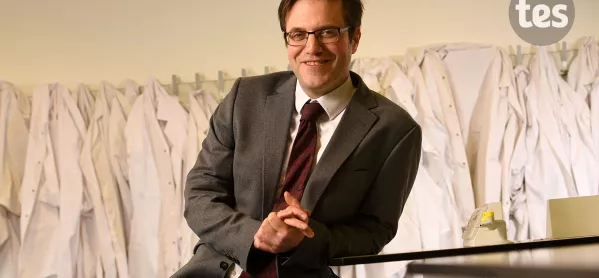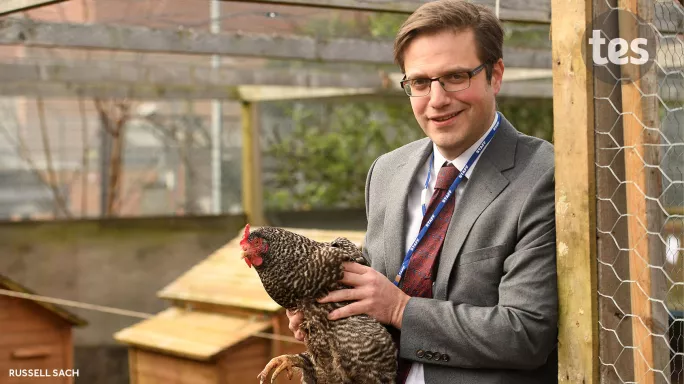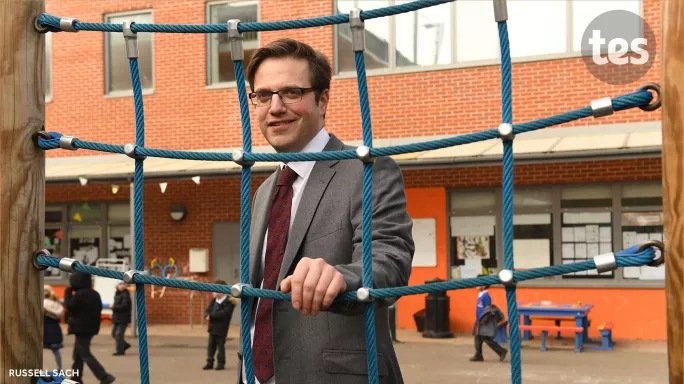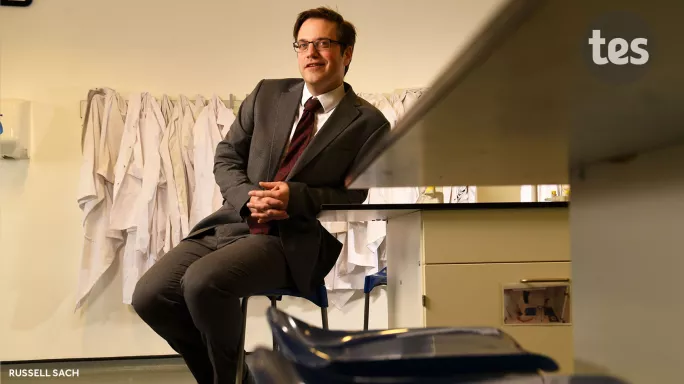- Home
- Meet the head who built a school for social justice
Meet the head who built a school for social justice

What features would you include if you could design your own school from scratch?
Ask Ed Vainker. He is in exactly that position with Reach Academy Feltham in West London. And his decisions seem to have been the right ones. The school was judged “outstanding” within a couple of years and helped earn him an OBE.
“Massive bits of wood all came from Austria with the windows all cut, and then they just screwed them together like Lego,” he remembers.
Read: These GCSE results show that free schools are flourishing
Listen: Could this pupil’s song become Christmas number one?
Related: ‘Harry’s story shows the challenge of illiteracy’
“It was an unbelievable privilege to start something from scratch. The beauty in designing your own school means you can have common-sense policies.”
Vainker and his co-founders can be credited with choosing an area of high need to build their all-through free school catering for pupils aged 3-18.
He describes this deprived corner of Hounslow as “a mixed community”, and says there have historically been problems with community cohesion, including support for the BNP.
But he relishes a challenge.
“I believe in social justice,” he says. “That’s why we’re here. It’s not an accident that we wanted to serve a really diverse community.”

The school has the highest percentages of pupils with special needs, and of looked-after pupils, in the borough, Vainker says. It also has a third of places ringfenced for pupil-premium children.
So it may have come as a surprise to some when, in 2017, the first Reach pupils sat their GCSEs, and their results put the school among the best in the country. The Department for Education figures for that year show that 95 per cent of pupils achieved a grade 4 or above in both English and maths compared with 64 per cent nationally (and it’s not dropped below 82 per cent since). And the Reach Progress 8 score was “well above average” at 1.11 compared with -0.03 (the national average).
But to those in the know, it had already become clear that something special was going on - hence the visits of Boris Johnson (when he was mayor of London), prime minister David Cameron and the father of England’s free-schools movement, Michael Gove.
Of less success in a different performance table was last year’s attempt at hitting the Christmas number one spot in the charts. But that was yet another example of something special in a school that has (among other projects) a children’s hub, which works with families before their children even come to nursery or Reception, and where parents run antenatal classes. There’s also a little farm, and a community café is in the pipeline.
Sliding-doors moment
Vainker was awarded his OBE last year for services to education. It’s an honour that might have seemed unlikely back in 2007 when he quit his job in teaching in what he describes as “a sliding-doors moment”.
“It felt like [my school] wasn’t the right place for me to grow,” says the 38-year-old, who joined the profession as part of the initial Teach First cohort in 2003. “They were offering me way more than any other school would pay me, and I was quite close to buying a flat - but I was thinking, ‘If I stay here now, I don’t think I’m going to learn much and I’m going to be over-promoted.’”
The following year, Vainker moved to Canada hot on the heels of a woman whom he had fallen in love with (who later became his wife and the mother of his two children).
Just six weeks after they met, she moved from London to Washington DC to take up a job with the World Wildlife Fund, and Vainker managed to stay (relatively) close after winning a scholarship on a social justice programme in Montreal, which was sponsored by McGill University.
“It was quite an odd thing,” he says. “It was a programme for people under 30 who were interested in social justice. You go and live in this house and you just think about what you’re going to do and you have a free year, and you can go to classes at the university.”
As well as visiting schools in both Canada and the US, he also worked on the Obama election campaign for a month and spent time with the Native American community in Canada.
But you could say Reach Academy Feltham was always part of his destiny.
“The key reason why [Reach] has been successful is that I had some time when I was out of the classroom,” he says. “The time when I was doing other things and having other experiences was really valuable.”

The following year, Vainker was able to join his future wife Emily in Washington DC after landing a job with Teach For All, a network organisation which supports organisations like Teach First all over the world.
And it was there that he learned about organisations that would go on to influence what’s now happening at Reach.
He learned about the work of the Harlem Children’s Zone, for example, which tackles poverty through parenting workshops and a preschool programme. And there’s an American community organisation called StriveTogether, Vainker says, which seeks to unite different sections of the community, and is now influencing ideas at the Reach Children’s Hub.
“What’s amazing is the vision and entrepreneurialism and the Americanness and the ‘oomph’. So seeing all that kind of inspired me to feel I could take [Reach] on.”
Accused of jumping the queue to headship
Vainker was also inspired by his time at Ark Burlington Danes Academy (the school he left), also in West London, which was the first school to be taken over by the Ark multi-academy trust. He says his “mind was blown” by the ideas of Ark’s education director, the American Jay Altman, who was a big influence.
And just as Reach Academy Feltham is not typical, nor is Vainker’s own education.
Until the age of 11, he grew up in Luxembourg where his father, who is French, worked for the European Parliament.
He attended a European school where the common language between pupils of different nationalities was French (the subject he taught, along with history).
When Vainker returned to London to set up Reach in 2012 (along with co-founders Rebecca Cramer and Jon McGoh), teacher friends thought he was “jumping the queue” to headship.
“I’d spent four years in America having a nice time while they’d been [in schools] working really hard and taking on more responsibility, and I think there’s definitely a sense that you have to serve your time and do, say, 15 years before you become a head,” he says. “There’s a lot to be said for that, and I wouldn’t have been confident in 2012 in running a big school.”
Reach Academy Feltham started with just Reception and Year 7 and now has a full school of pupils aged 2-18. Each age group is on a different floor (youngest on the ground floor) in a building in which the teachers move around not the kids to save time in transition.
Another common-sense design feature afforded by designing a school from scratch, says Vainker, is that pupils eat on their own floors so there is not a big canteen which can be “mega-stressful”.
The all-through system allows the school to design a curriculum which flows, and it allows staff to build long-term relationships with 900 families.
‘A crisis is a chance to strengthen relationships with families’
Vainker and his staff are all on first-name terms with pupils and their parents, and all parents have Vainker’s mobile number.
Vainker and his staff do home visits before a pupil starts in the school, and also where a child is “experiencing barriers to learning”, although he admits that having just 60 pupils in each year group makes this more feasible than for other schools.
“So much of what matters to a young person’s development happens outside of school,” he says. “So if we have a child who’s not doing well, say in Year 1, the questions we would be asking are: are they sleeping enough? Do they have good routines at home? Are they eating well? You do find that some of the children are going to bed super late.
“Some visits are to cook together with a child and their mum and look at bedtime routines. And Kay, our family support worker, will sometimes go round for morning routines where it’s really stressful.
“When there’s a crisis - when there’s a real problem in a family - that presents huge barriers to that person being successful in school, but it also gives us an opportunity to support and strengthen our relationship with that family, whether that’s around debt, or an immigration hearing, or mental health or whatever.”
The school proved so popular it had to change its catchment area; first to only pupils living 120 yards from the school, which is on Feltham High Street.
Later, to avoid driving up property prices on one section of the street compared with another, a lottery system was introduced for pupils who live within a mile and a half from school.

‘We’ll repeat our success with another, bigger school’
Vainker has plans to build a second, bigger school, with 90 pupils per year group, on the disused army barracks next door. He says it will cater for thousands of new homes set to be built in the area. And if he has his way, the school will include provision for antenatal to age 3.
“That is the place,” he says. “Pretty much all our kids in secondary who are accessing mental health support or who are vulnerable in some way have experienced trauma between birth and 3 years old.”
And how would he assess his own performance?
“We’re probably on a six and a half or a seven at the moment,” he says. “But we want to get to a 10 and that means doing more of the community work and finding ways to work more broadly.”
He might be being a little harsh.
CV
Education
1986-1991 European School, Luxembourg
1991-1993 Kings Primary, Cardiff
1993-1999 The King’s School, Canterbury
1999-2002 History (BA), University of Cambridge
2003-2004 Secondary MFL (QTS), Canterbury Christ Church College (Teach First)
2005-2008 Comparative Education (MA), Institute of Education
Work
2002-2003 Access and schools’ liaison officer, Downing College, Cambridge
2003-2006 French and history teacher, St Thomas the Apostle College, London (Teach First)
2006-2007 Literacy curriculum lead in academy leadership team, Ark Burlington Danes Academy, London
2007-2008 Programme director, Reach Cambridge, Cambridge, and literacy adviser, Ark Schools
2008-2009 Sauvé scholar, Montreal (affiliated to McGill University)
2009-2012 Senior director, Teacher Support, Teach for All, Washington DC
2012-2019 Principal and co-founder, Reach Academy Feltham
Keep reading for just £1 per month
You've reached your limit of free articles this month. Subscribe for £1 per month for three months and get:
- Unlimited access to all Tes magazine content
- Exclusive subscriber-only stories
- Award-winning email newsletters



